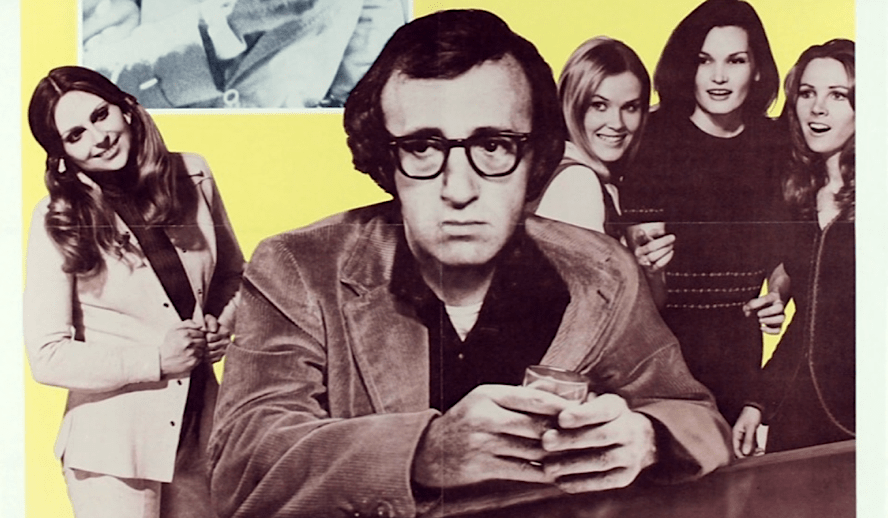Table of Contents

Photo: ‘Play it Again, Sam’
Allan and Bogey
Herbert Ross’s 1972 comedy ‘Play it Again, Sam’, starring Woody Allen, hit 50 years old this year, but upon re-watching, the more dated aspects of the film peel away to reveal the remarkably perceptive core of the film. Despite following a typical Allen character: neurotic, jittery, sarcastic, intellectual – in this case, a unique neurosis is added to the usual roster. Allan, the protagonist of the film, is shadowed by a mental projection of Humphrey Bogart who routinely doles out advice to the romantically inept Allan in the form of raspy noir-ish proverbs. Almost always blindly accepted by Allan and almost never wisely so, ‘Bogey’ is relied on in all matters of love and friendship.
Things to do:
- Subscribe to The Hollywood Insider’s YouTube Channel, by clicking here.
- Limited Time Offer – FREE Subscription to The Hollywood Insider
- Click here to read more on The Hollywood Insider’s vision, values and mission statement here – Media has the responsibility to better our world – The Hollywood Insider fully focuses on substance and meaningful entertainment, against gossip and scandal, by combining entertainment, education, and philanthropy.
The dynamic which unfolds from this absurd relationship has not lost its humor since the movie’s release. Allan couldn’t be farther from Bogart when it comes to suaveness or indeed a romantic success. The second scene of the film sees Allan being asked for a divorce by his wife. “You’re one of life’s great watchers”, his soon-to-be ex-wife tells him. “Why can’t I be cool? What’s the secret?”, he sighs to himself. It is at this moment that Bogart first appears, shrouded in darkness, coolly reassuring Allan that “there’s no secret”, and that the problem is “nothing a little bourbon and soda couldn’t fix”. The contrast between mental projection and mental projectionist is made no more clear than in Allan’s attempt to follow this advice, where he’s left sputtering and spitting out his tentative order of bourbon from the bar.
Parasocial Relationships
Putting aside the overwhelmingly positive commentary this article has so far rattled off, it wouldn’t be wholly unfair to say that the movie’s message might have seemed rather bland upon release. Sitting somewhere between “be yourself” and “Bogart films are more sexist than you might remember” before recent discussions surrounding parasocial relationships, the film’s bite would have been hard to discern.
Related video: Come Behind The Scenes of ‘Elvis’ | Austin Butler, Tom Hanks and Baz Luhrmann
Nevertheless, the film has taken on a new and more incisive meaning in light of newfound popular wisdom surrounding unhealthily overzealous fan-celebrity relationships. This kind of excessive attachment to celebrities is both critiqued and explained by the 1972 film, in a way that can be better understood now that the concept of parasocial relationships is the common currency. Oxford Reference describes how in parasocial interactions, “regular viewers [of mass media] come to feel that they know familiar television personalities almost as friends”, clarifying that “parasocial relationships psychologically resemble those of face-to-face interaction but they are of course mediated and one-sided”.
The harmful nature of such relationships is immediately drawn attention to by the film in the opening scene, which, strangely enough, begins with the closing scene from ‘Casablanca’, which had its own 80th anniversary this year. You’d be forgiven for thinking you’d walked into the wrong theatre. The illusion is shattered, however, with a slow zoom-out, which reveals that the viewer is not actually watching Casablanca, but rather spectating a cinema of people watching it.
Related article: MUST WATCH – The Hollywood Insider’s CEO Pritan Ambroase’s Love Letter to Black Lives Matter – VIDEO
This disorientating lapse of perception is swiftly mirrored by the protagonist, who we then witness have his own illusion shattered when the lights of the theatre come back on and he’s snatched glumly back to reality. For a moment, it all felt real, like he was Bogey, like he’d “always have Paris”. “Who am I kidding? I’m not like that. I never was. I never will be. It’s strictly the movies” he moans. These opening lines of the film (excluding Bogart’s on-screen ones) set the tone for the critique the film will make, which homes in on three principal problems with parasocial relationships.
One aspect of parasocial interaction which the film represents can be seen in Allan’s mimicry of Bogart’s voice. In one early scene, Allan talks into the mirror with that distinctively hoarse Bogart accent, imagining he has a girl in the bed behind him. The horribly sexist way in which he talks to her is what he imagines to be the way a ‘real man’ would talk. The lighting then darkens and suddenly Allan imagines he’s in a film noir. When the fantasy finally dissolves the lighting shifts back, and Allan is left looking sad and embarrassed, pathetically pushing out the smoke he’s just inhaled in the least noir fashion you’ve ever seen – one imagines he couldn’t have managed it in less suave fashion if he blew it out through a snorkel.
Related article: The Hollywood Insider’s CEO Pritan Ambroase: “The Importance of Venice Film Festival as the Protector of Cinema”
Related article: The Masters of Cinema Archives: The Hollywood Insider Pays Tribute to ‘La Vie En Rose’, Exclusive Interview with Director Olivier Dahan
Related article: – Want GUARANTEED SUCCESS? Remove these ten words from your vocabulary| Transform your life INSTANTLY
Successful or not, though, this form of imitation is actually described as one of the common tenets of parasocial interaction. Jayne Goode describes how “audience members adapt language behaviors to TV characters” when they enter into parasocial relationships. ‘Play it Again, Sam’ clearly demonstrates the danger of such a practice. TV and Film characters are seldom especially good people, and those who are good tend even less frequently to be realistic. One must draw inspiration from reality, and where possible from nowhere but yourself.
The second and perhaps most potent critique of the film levels at parasocial relationships is its portrayal of the fragility of self-worth derived from such interactions. Allan’s imaginary Bogart props up his self-worth, his confidence, and even his very image of himself. Inevitably, this can never last. Whenever Allan feels a pang of insecurity, he retreats from reality and reassures himself with a dismissive word from Bogart – “nothing a little bourbon and soda couldn’t fix”.
Related video: EVOLUTION: Every Tom Cruise Role From 1981 to 2021, All Performances Exceptionally Poignant
Related article: A Tribute to Johnny Depp: The Actor and Musician Who Defined Range
Related video: EVOLUTION: Every Johnny Depp Role From 1984 to 2020, All Performances Exceptionally Poignant
Related article: A Tribute to the Hero & President Volodymyr Zelenskyy: Comedian/Actor, Ukraine’s President and Heroic Leader
Naturally, the moment he returns to the situation at hand he finds himself in the same predicament. When you go on holiday to escape your problems go with you; the same can be said for trips into fantasy. ‘Play it Again, Sam’ demonstrates how strong emotional ties to celebrities, particularly those which form a part of your identity, are unsound and fickle. One’s sense of self ought to be built on something sturdier than the casual imaginary murmurings of a movie star who doesn’t even know your name.
Lastly, if the story of ‘Play it Again, Sam’ is evidence of anything it’s the harmfulness of the seductive pull of a parasocial relationship – its power to draw you out of reality and into a world where you’re something better, or friends with someone better. The earlier described opening scene is as good an example as any of this fact. Upon walking out of the cinema and back into reality, one imagines that if Allan had listened to his own words: ‘I’m not like that. I never was’, he might have saved himself all the panic and trouble he’ll put himself through in pursuit of his warped noir-ish ideal of manliness or greatness. Indeed, Allan has his most successful moments when he’s acting of his own volition, not Bogart’s. It’s when he dons that sly grin and starts regurgitating long-since-passé Bogartisms that he finds himself floundering, or else not fully enjoying or focussing on the moment – as in the scene where his best friend Linda visits his apartment.
Related article: EVOLUTION: Every Henry Cavill Role From 2001 to 2021, All Performances Exceptionally Poignant
Related article: EVOLUTION: Every Chris Evans Role From 1997 to 2020, All Performances Exceptionally Poignant
Related article: #metoo Revolution: Powerful Questions That Need Answers
Related article: FACT-CHECKED Series: Timothee Chalamet and 32 Facts about The Young Superstar
‘Play it Again, Sam’ – What We Can Learn
‘Play it Again, Sam’ is not without flaws. Most notable of all is the ending, which although funny and satisfying, is perhaps slightly too perfect in the Hollywood sense of the word. Moreover, in attempting to provide symmetry in terms of plot, it sacrifices thematic symmetry, slightly treading on the toes of the message it otherwise upholds. But this kind of weakness belongs to the variety that one can smirk at and stretch the meaning of the word ‘charming’ on behalf of. Overall, ‘Play it Again, Sam’ plays as funny as it always did, but with age, it has taken on an earnestness that would have been hard to perceive back in ’72. Plain to see now, however, is that it has a point to make, and a prescient one at that. Parasocial relationships are rarely portrayed on film even now, but if one turns the clock back half a century the pickings would be even slimmer – the only examples that spring to mind are another Allen film; ‘The Purple Rose of Cairo’ (1985), and Scorsese’s ‘The King of Comedy’ (1982), both from a decade later. Perhaps the difficulty comes from a lack of interest; why portray a relationship which isn’t actually there, only perceived to be there, when one can present a real, living, breathing, relationship? Whatever the reason, ‘Play it Again, Sam’ vaults this obstacle to mine the comedic content of parasocial relationships in a manner thoughtful enough to glean and analyze their problematic content too.
By Samuel Sandor
Click here to read The Hollywood Insider’s CEO Pritan Ambroase’s love letter to Cinema, TV and Media. An excerpt from the love letter: The Hollywood Insider’s CEO/editor-in-chief Pritan Ambroase affirms, “We have the space and time for all your stories, no matter who/what/where you are. Media/Cinema/TV have a responsibility to better the world and The Hollywood Insider will continue to do so. Talent, diversity and authenticity matter in Cinema/TV, media and storytelling. In fact, I reckon that we should announce “talent-diversity-authenticity-storytelling-Cinema-Oscars-Academy-Awards” as synonyms of each other. We show respect to talent and stories regardless of their skin color, race, gender, sexuality, religion, nationality, etc., thus allowing authenticity into this system just by something as simple as accepting and showing respect to the human species’ factual diversity. We become greater just by respecting and appreciating talent in all its shapes, sizes, and forms. Award winners, which includes nominees, must be chosen on the greatness of their talent ALONE.
I am sure I am speaking for a multitude of Cinema lovers all over the world when I speak of the following sentiments that this medium of art has blessed me with. Cinema taught me about our world, at times in English and at times through the beautiful one-inch bar of subtitles. I learned from the stories in the global movies that we are all alike across all borders. Remember that one of the best symbols of many great civilizations and their prosperity has been the art they have left behind. This art can be in the form of paintings, sculptures, architecture, writings, inventions, etc. For our modern society, Cinema happens to be one of them. Cinema is more than just a form of entertainment, it is an integral part of society. I love the world uniting, be it for Cinema, TV, media, art, fashion, sport, etc. Please keep this going full speed.”
More Interesting Stories From The Hollywood Insider
– Want GUARANTEED SUCCESS? Remove these ten words from your vocabulary| Transform your life INSTANTLY
– A Tribute to Martin Scorsese: A Complete Analysis of the Life and Career of the Man Who Lives and Breathes Cinema
– Do you know the hidden messages in ‘Call Me By Your Name’? Find out behind the scenes facts in the full commentary and In-depth analysis of the cinematic masterpiece
– A Tribute To The Academy Awards: All Best Actor/Actress Speeches From The Beginning Of Oscars 1929-2019 | From Rami Malek, Leonardo DiCaprio To Denzel Washington, Halle Berry & Beyond | From Olivia Colman, Meryl Streep To Bette Davis & Beyond
– In the 32nd Year Of His Career, Keanu Reeves’ Face Continues To Reign After Launching Movies Earning Over $4.3 Billion In Total – “John Wick”, “Toy Story 4”, “Matrix”, And Many More
play it again, sam, play it again, sam, play it again, sam, play it again, sam, play it again, sam, play it again, sam, play it again, sam, play it again, sam, play it again, sam, play it again, sam, play it again, sam, play it again, sam, play it again, sam, play it again, sam, play it again, sam, play it again, sam, play it again, sam, play it again, sam, play it again, sam, play it again, sam, play it again, sam

Outside of his ongoing MA degree in English and Philosophy at St Andrews, Samuel Sandor spends his spare hours writing – short stories, essays, articles on film, music, or any other subject he finds himself preoccupied by. Through all these strands, he strives to find a unique and unexpected way to look at the subject at hand. Without a concerted effort, it’s easy to form surface-level impressions of both the art and the news that one consumes. Sam’s pieces attempt to answer this interpretative simplicity by inducing curiosity in subjects one might ordinarily devote little thought to. It is this desire to transform viewpoints with novel ideas and to stoke deeper and more extensive conversations which attracted him to The Hollywood Insider.








